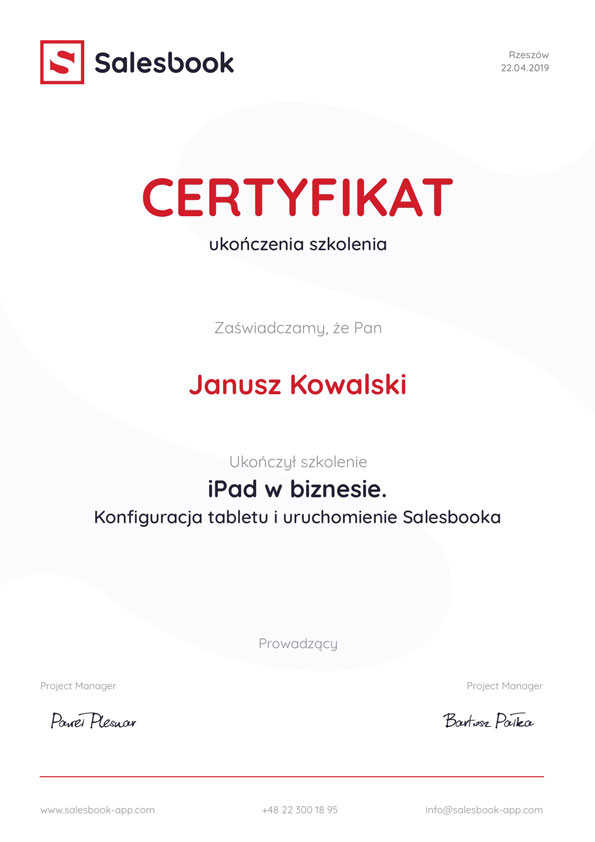

Sales

2 Jun 2023
Maximizing ROI (Return on Investment) is one of the main goals of small businesses and big companies. However, in order to increase sales and the effectiveness of customer service you need to know what activities are profitable. A modern CRM system is a credible analyst that will tell you how to be the best among your competitors.
Running your own business or being a sales rep, you often deal with the term ROI or ROI calculation. An acronym ROI means Return on Investment, and it helps you understand how much profit you gain from your investments.
Of course, every business generates revenue and bears the costs. An ROI calculation (Return on Investment calculation) should include something more than just the costs of an initial investment. You have to also consider other expenditures such as transaction costs, taxes, and maintenance costs.
You probably know the definition of ROI, however, you may not have heard about its origin. Probably it has its beginnings in the XX century in the gunpowder factory.
Some sources say that the father of ROI (ROI is also called The Dupont Formula) is an engineer Donaldson Brown who invented ROI in 1914 (some articles claim that it was in 1918 or 1919).
He invented ROI working for the company Du Pont de Nemours, which produced black gunpowder, and bought stakes of General Motors.
The bosses of this company thought about how to boost sales and improve financial statements. As wise people say, necessity is the mother of invention, and this is how an ROI metric was invented.
Calculating ROI is useful if you want to know if a particular investment (e.g. maintenance costs, consulting fees, materials costs, etc.) or even the whole business is profitable. You can also calculate ROI by taking your sales team activities into consideration.
How to obtain an ROI figure? There is a commonly used ROI formula (or an ROI equation):
ROI = Net Income / Invested Capital (present value = cost of investment)
You may have a lot of questions now. Why is ROI important? What is positive or negative ROI? How to make ROI calculations in practice? We have already written an article about how to calculate ROI, and we have explored the topic. Therefore, if you are eager to know more about the ROI formula calculation, we advise you to visit our blog.
That is why, in this article, we do not write more about how to calculate Return on Investment (ROI). We focus only on how CRM software (CRM stands for Customer Relationship Management) can help you maximize ROI.
Nowadays, entrepreneurs think twice before they decide to spend their money, and it is not surprising. Moreover, the sales process itself is very demanding – sales reps must be experts who advise customers. They struggle to stand out among competitors and take care of clients.
On the other hand, owners of companies deal with various costs of advertising products or services on the Internet, courses for employees, and implementation of new services. At the same time, they consider different ways of optimizing sales processes to generate increased sales. However, they need to ask themselves several questions to be successful.

If you want to maximize ROI in your business, you need to know more about:
These are only example questions about the effectiveness of activities in your company. There is one more equally essential question – does your business have CRM software that gathers reliable customer data? CRM systems can have different functions, and it is difficult to calculate ROI and maximize it without knowledge about profitability.
“CRM is your GPS to a better route on your business development journey” – said Bobby Darnell, an entrepreneur and CRM consultant.
Why is CRM software compared to GPS? The answer to that question is complex. Thanks to good CRM in your company, you can organize and automate many processes, and as a result, it brings you profits. Moreover, due to CRM tools, you can maintain good relations with clients. All of that is the key to winning sales opportunities more often.
According to HubSpot and its information, the implementation of CRM in a company can increase sales by 29% and efficiency by 34%. The fact that customer information is accessible shortens the sales process from 8 to 14%.
However, what exactly is CRM?
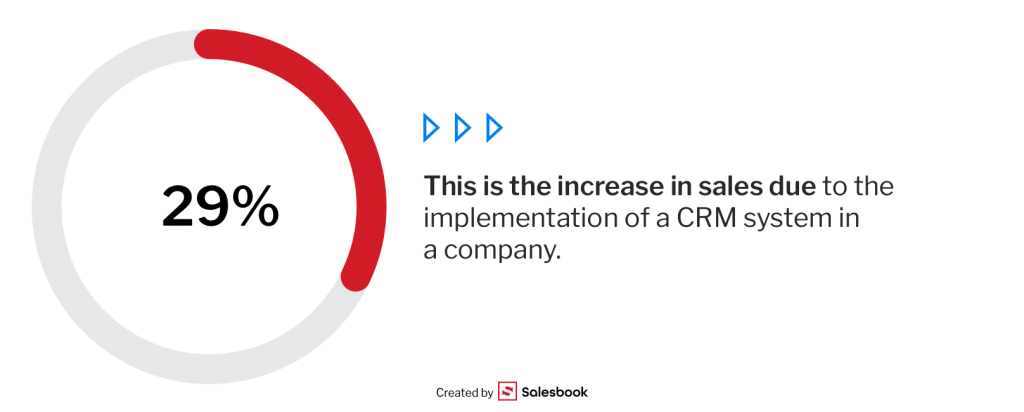
As we have explained, CRM stands for Customer Relationship Management. A CRM platform or system gathers important information about customer interactions, groups it, and analyzes it.
CRM is a system that is good technical support and automates many processes between sales reps and customers. Furthermore, it helps sales teams, marketing teams, and the management board to communicate. This is the general definition of CRM software.
In practice, CRM tools are very useful in an everyday work of a salesperson. CRM supports the daily routine and provides them with hard data about clients and their preferences. The functions of CRM should be adjusted to the needs of sales teams and the needs of your company.
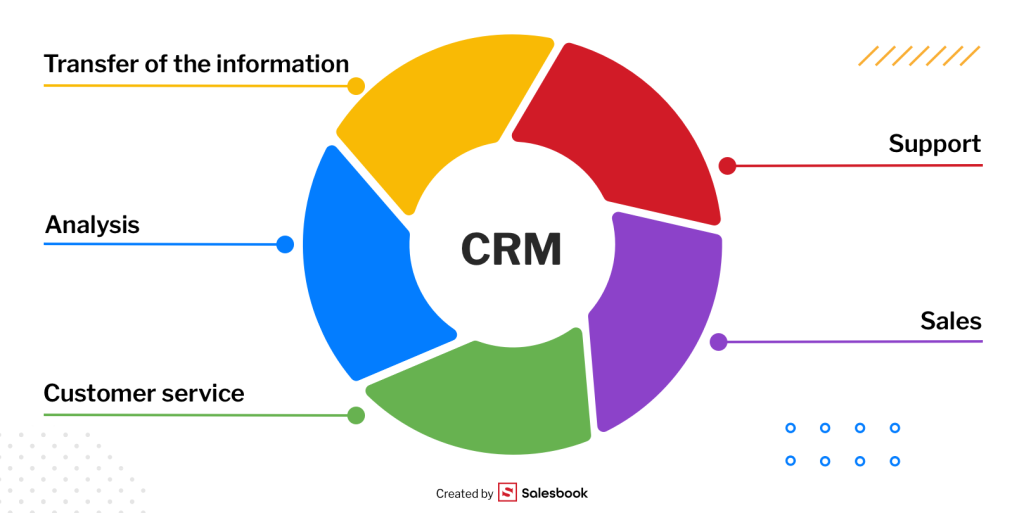
Your next step should be an analysis of data and the implementation of solutions that bring you long-term success and more money from sales.
Robert Shaw, Ph.D., the author of the book “Measuring and Valuing Customer Relationships” summarized it that way,
“CRM is an interactive process of striking the optimal balance between investments and customer satisfaction to maximize profits.”
We should start from explaining the connection between the high ROI and customer information that CRM software gathers. First of all, if you know your customers better, you can offer them better solutions, tailored to their needs. As a result, you sell more products or services, and your business grows.
It is hard to imagine that a professional salesperson uses a pen and writes down information about a customer after every meeting. People who demand it in their businesses hear, “Should I sell or type in the information into CRM?”. Do you agree with us that it should not be the case?
A good CRM platform should make it easier for sales reps to maintain relations with clients and manage the sales process.
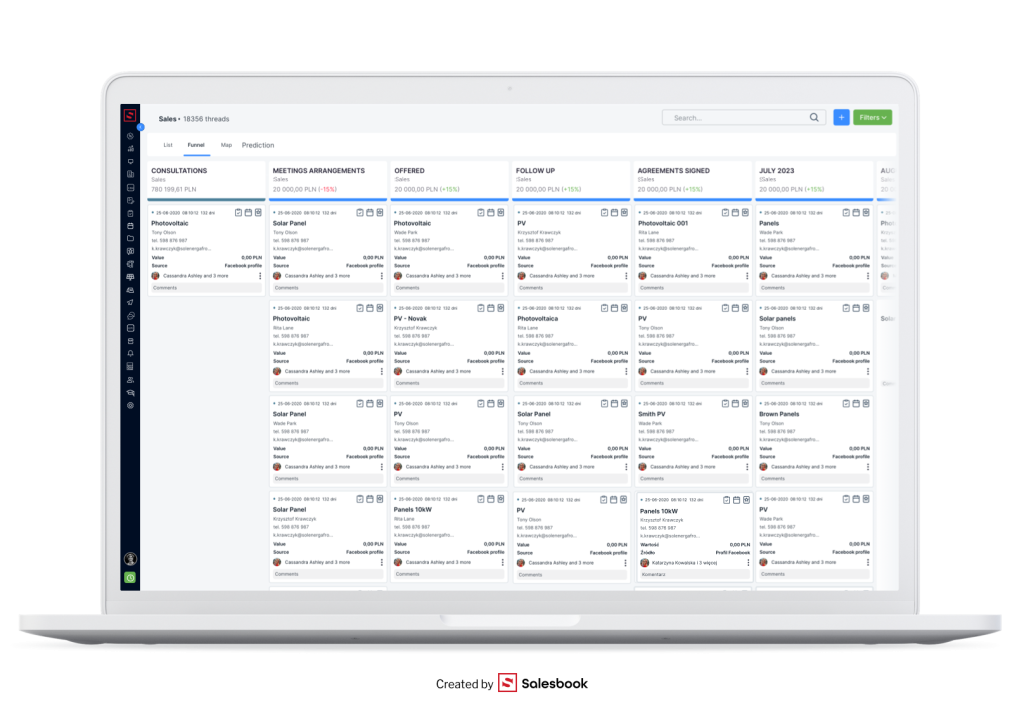
As it turns out, there are modern CRM systems that support salespeople at many levels. One of them is Salesbook, a professional CRM platform and application for sales reps and managers.
The CRM system from Salesbook is cloud-based so it means that you do not have to make any extra investments to use it.
It is a well-thought-out tool that supports both salespeople and managers. It consists of:
In what way does Salesbook stand out among its competitors? It is available on mobile devices such as iPads and iPhones. This is an advantage that makes the sales process flexible.
According to WebfX, an e-marketing agency, 50% of companies confirm that mobile selling increases their sales and 45% of organizations claim that their revenue grows because of the implementation of CRM.
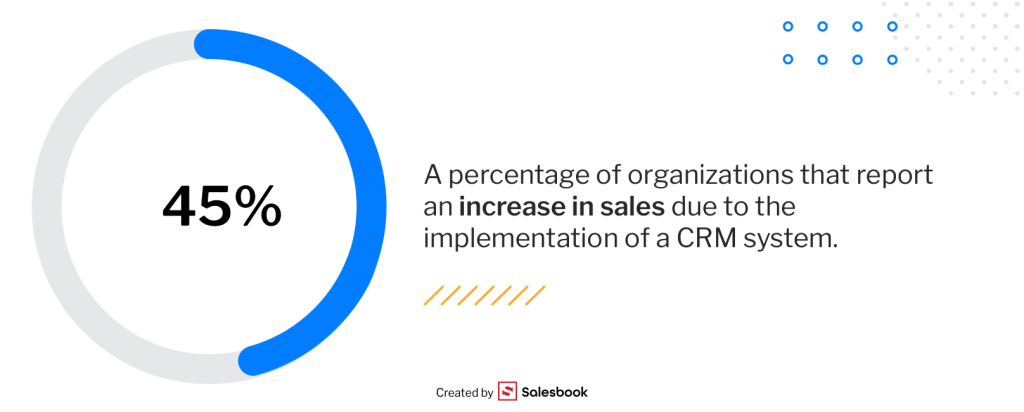
Does Salesbook have more advantages? If you want to make adequate ROI calculations and raise your net profits, you need to know more about successful sales activities.
Only hard data can give you the knowledge that you need. Salesbook allows you to set key performance indicators, analyze data, and measure ROI. It provides you with both quantitative and qualitative data, which gives you the whole perspective of a situation in your business.
CRM from Salesbook receives data automatically when a salesperson uses an app and a tablet during a meeting. The place of conversation is irrelevant. Either way, a salesperson does not have to type information into the system. Moreover, a sales rep knows that essential details are in CRM.
Summing up, CRM software contains such information as the name and surname of a client, address, and the name of a company. However, do not forget that this is only the basic data that CRM has.
CRM from Salesbook gathers more than basic information. You will know, for example, the sources of generated leads, cities or regions that your customers come from, the products that they buy, or why they choose certain services or products. Moreover, you will find out more about how often they respond to e-mails or why they do that so often.
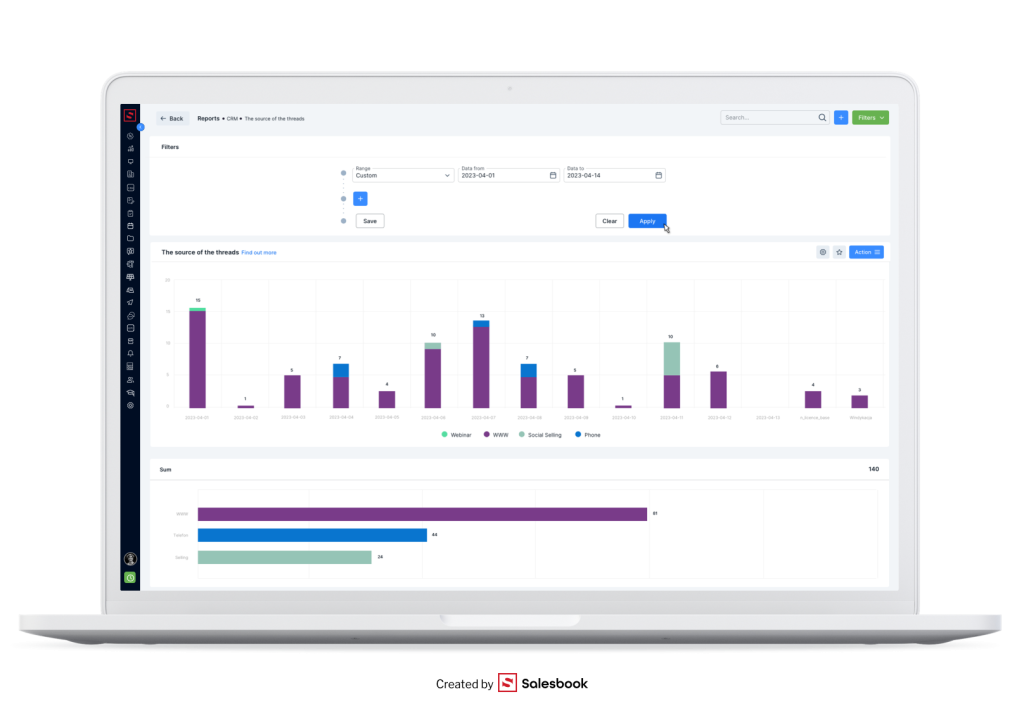
You will find a complete list of contacts in CRM. Therefore, you can modify your sales cycle or the way you plan your tasks. Thanks to this, you can focus on reaching clients that generate more profits.
However, customer relationship management is something more complex than just dealing with data. How can you make the most of CRM?
Philosophy related to CRM claims that it is good to maintain friendly relationships with customers and improve the quality of customer service. How can this kind of attitude make higher ROI?
According to HubSpot, a 5% increase in customer retention can lead to a higher profit (from 25% to 95%). However, if sales reps want to take care of customer satisfaction, they must make phone calls, send follow-ups and arrange meetings. Are they able to find enough time to deal with all these activities? What can help them? For sure, professional CRM and automation.

CRM software from Salesbook can increase the effectiveness of sales teams by more than 50%. Thanks to the automation of such activities as sending follow-up e-mails or SMS-es, planning tasks, or generating contracts, salespeople save their time. They can focus more on new clients and closing deals.
As we have mentioned, one of the advantages of CRM is automation which can affect relationships with customers and customer experience.
Due to the fact that Salesbook gathers data automatically during a meeting, a sales rep can prepare an offer immediately (or even its several variants).
Firstly, if a salesperson uses Salesbook, they can focus more on a conversation with a customer and listening to their needs. CRM software already has the necessary information, therefore, a sales rep does not have to think about that.
Secondly, a sales rep equipped with CRM with professional materials about your company and an offer is more effective than a salesperson having traditional folders. Why is that? It is easier to engage a client in an interesting conversation if you have an interactive tablet.

Furthermore, if a customer feels that a sales rep is really devoted to their business case, it improves their customer experience.
On the other hand, a customer experience affects possible profits. Look at some data given by Zipia the Career Expert this year:
We have already said that Salesbook gathers data and makes the work of sales reps easier. However, there are more advantages of using Salesbook than those presented above.
Salesbook supports communication between departments in your company, for example, sales department, customer success specialists, or marketing teams. All employees have access to all data gathered in a system, and, therefore, they can automatically generate the reports they need.
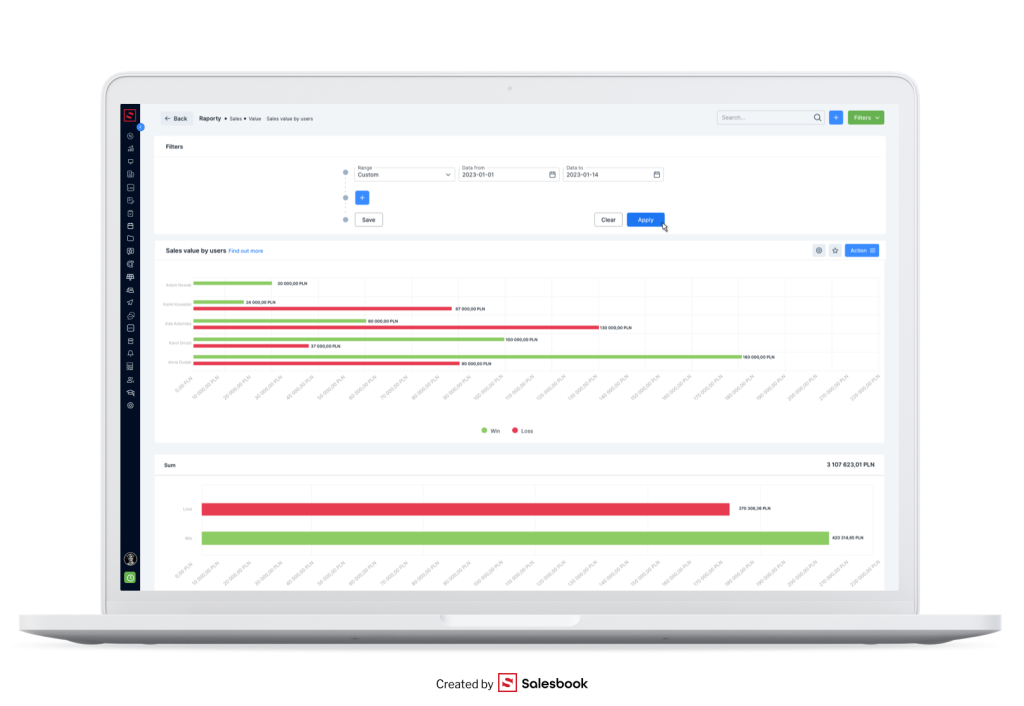
As HubSpot reports, 22% of leaders appreciate this opportunity in CRM, and the same percentage of them point out that automation is the biggest asset of CRM.
If you use professional CRM, you choose the best sales strategy to follow and optimize many processes in your company.
What data can you analyze if you use Salesbook?
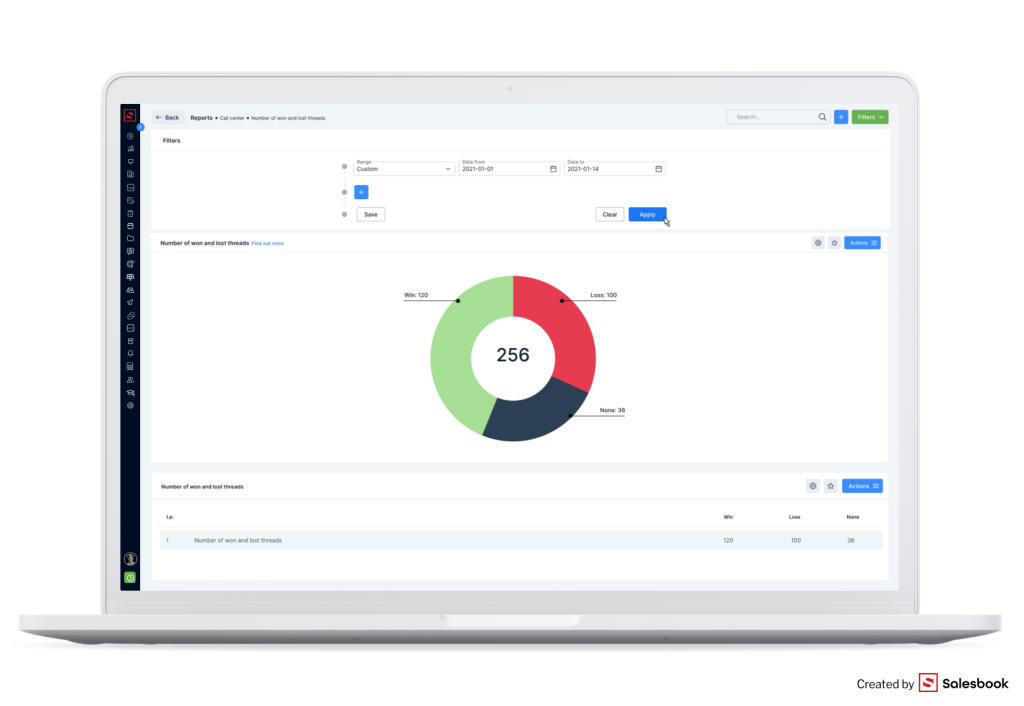
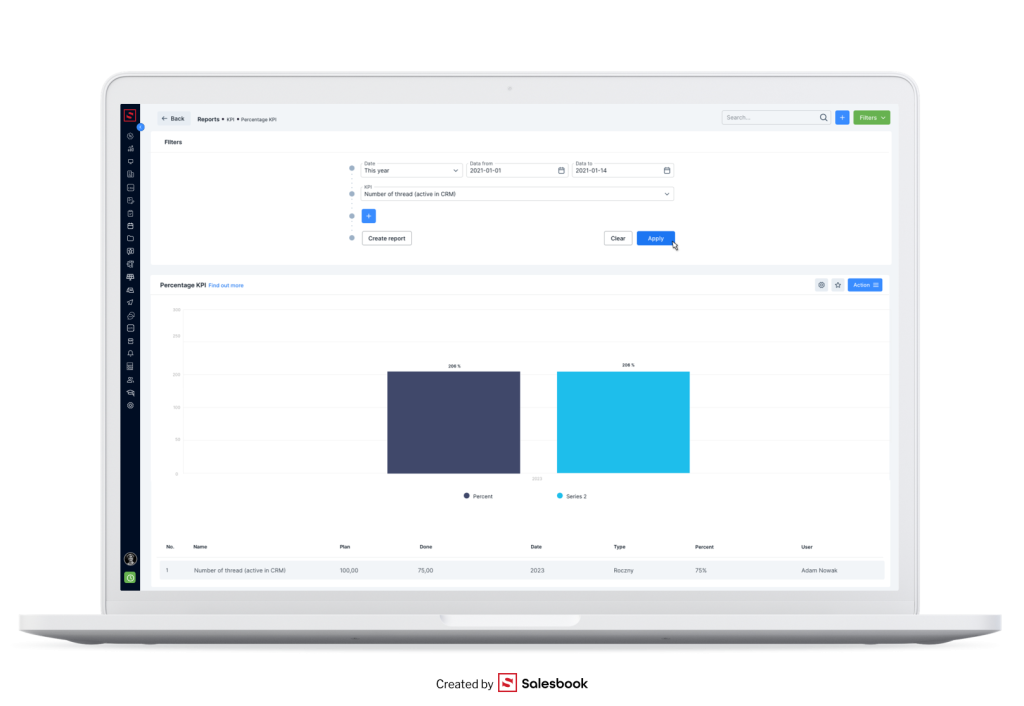
Summing up, CRM from Salesbook allows you to track the KPIs and activities of a sales team. Moreover, you can analyze the whole sales process – from the first contact with a client to closing a deal. On account of that, you can draw conclusions on the basis of hard data and make decisions at the right time.
Now you know the most important functions of CRM and how they can be included in your business. Let us summarize the advantages.

Are you interested in Salesbook and how can it help you increase the net income in your business? Try our free demo.

Any questions? Feel free to contact us.
+44 203 807 0179
Our Customer Success Team is available from Mon. to Fri. 9am - 5pm CET.
We support inquiries, processes of configuration and use of Salesbook app, as well as billing and technical issues.
